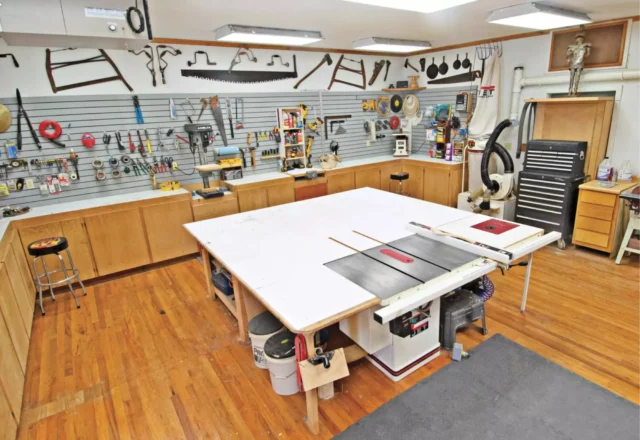Building a home workshop is a dream for many DIY enthusiasts and hobbyists. It’s a space where creativity meets functionality, where projects come to life, and where you can escape the hustle and bustle of everyday life to focus on your passions. Whether you’re a seasoned DIYer or just starting out, having the right tools and equipment is essential for turning your workshop into a productive and efficient space. In this guide, we’ll explore the essential tools and equipment you need to build your home workshop, with a special focus on the indispensable role of spanners.
Table of Contents
1. Planning Your Workshop Layout
Before diving into the tools and equipment, it’s crucial to plan the layout of your workshop. Consider factors such as available space, lighting, electrical outlets, and storage options. A well-organized workshop not only enhances productivity but also ensures safety and ease of use.
2. Essential Hand Tools
Every home workshop should be equipped with a basic set of hand tools that are versatile and indispensable for a wide range of tasks. These tools allow you to tackle various projects with ease and precision, making them essential assets in any DIY arsenal. Here are some must-have hand tools for your workshop:
- Screwdrivers: Ideal for driving screws into wood, plastic, or metal surfaces, screwdrivers come in various sizes and types to accommodate different screw heads.
- Pliers: From gripping and bending to cutting and twisting, pliers are versatile tools that can handle a multitude of tasks. They’re essential for grasping small objects or holding components in place while you work.
- Hammers: Whether you’re driving nails, shaping metal, or breaking apart materials, a hammer is a fundamental tool in any workshop. Choose a hammer with a comfortable grip and a variety of striking surfaces for versatility.
- Spanners: Used to tighten or loosen nuts, bolts, and other fasteners. They come in various styles, including adjustable spanners and combination spanners, and are essential for mechanical and assembly tasks.
- Utility Knife: A sharp utility knife is invaluable for cutting materials such as cardboard, plastic, and insulation. Its retractable blade makes it safe and convenient to use for precision cutting.
3. Power Tools for Efficiency
While hand tools are indispensable, power tools can significantly enhance efficiency and precision in your workshop. Invest in essential power tools such as a drill, circular saw, jigsaw, and sander, depending on your projects and preferences. When using power tools, always follow safety precautions and wear appropriate protective gear.
4. Specialty Tools for Specific Tasks
Depending on your interests and projects, you may need specialty tools for specific tasks. For woodworking enthusiasts, this might include chisels, hand planes, and clamps. Metalworkers may require files, vises, and angle grinders. Evaluate your project requirements and invest in specialty tools accordingly.
5. Storage and Organization Solutions
A clutter-free workshop is a productive workshop. Invest in storage solutions such as shelves, cabinets, pegboards, and tool chests to keep your tools organized and easily accessible. Labeling drawers and bins can further streamline your workflow and save time searching for tools.
6. Lighting and Ventilation
Good lighting and ventilation are often overlooked but essential aspects of a functional workshop. Ensure adequate lighting to illuminate your work area and reduce eye strain. Natural light is ideal, but supplement with task lighting as needed. Proper ventilation is crucial, especially when working with paints, solvents, or woodworking dust. Consider installing exhaust fans or air filtration systems to maintain a healthy workspace.
7. Ergonomic Workbench and Seating
Your workbench is the heart of your workshop, where the magic happens. Invest in a sturdy, ergonomic workbench with ample workspace and integrated storage options. Consider the height and layout of your workbench to promote comfortable posture and reduce strain during extended periods of work. A comfortable seating option nearby allows you to take breaks and plan your next steps without leaving the workshop.
8. Safety Equipment and First Aid
Safety should always be a top priority in any workshop. Equip your workshop with essential safety gear such as safety glasses, ear protection, dust masks, and gloves. Keep a well-stocked first aid kit within reach in case of accidents or injuries. Regularly inspect your tools and equipment for wear and tear, and replace or repair as needed to maintain safe working conditions.
9. Maintenance and Tool Care
Proper maintenance and care of your tools are essential for their longevity and performance. Keep your tools clean and lubricated to prevent rust and corrosion. Sharpen blades and replace worn-out parts regularly to ensure optimal cutting and drilling performance. Store tools in a dry, climate-controlled environment to prevent damage from moisture or extreme temperatures.
10. Continuous Learning and Improvement
Finally, never stop learning and improving your skills as a craftsman. Take advantage of online tutorials, workshops, and community resources to expand your knowledge and techniques. Experiment with new tools and materials to push the boundaries of your creativity and craftsmanship.
In conclusion, building a home workshop is an exciting journey that requires careful planning, investment, and dedication. By equipping your workshop with essential tools and equipment, including versatile spanners, you can create a space where your DIY dreams can flourish. Remember to prioritize safety, organization, and continuous learning to make the most of your workshop experience. Happy building!








